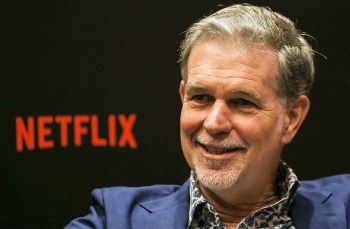TEXT OF INTERVIEW
Kai Ryssdal: When you’re up high in an airplane, flying from, say, New York to L.A., the ground below is a bit of a blur. Mountains and rivers and lakes are visible. But the only other constant are the roads. Thousand and thousands of miles of them. They’re just there, and most people don’t really think much else about them.
Ted Conover’s spent the past couple of years walking and driving roads all over the world for his latest book. It’s called “The Routes of Man.” Ted, it’s good to have you here.
TED CONOVER: Thanks, Kai.
Ryssdal: The roads you have in this book run from those super highways, you ride them in Africa, to a frozen river up in the north of India. I thought that was the most fascinating part of this book. Tell us that story.
CONOVER: That’s a valley called Zanskar, which is just a few miles from the border with Pakistan and China. Not far from there are thousands of Indian troops who need food in the winter. So the government wants to build a real road through this gorge that leads in and out of Zanskar. Until they get around to that — and it’s going to be a while, because it’s a gigantic project — the people in that valley get in and out on a frozen river, during about six weeks of the winter when it’s hard enough to walk on. So I found a group of kids who are using it to get to school outside the valley, and I walked with them for four days. It’s a pretty amazing adventure if you’re somebody like me to see a road that’s only a road for six weeks, but if you’re them, they like can’t wait until it’s a real road.
Ryssdal: Oh, is that right?
CONOVER: Yeah, they say this is so embarrassing to have a road like this.
Ryssdal: Did you find, generally speaking, that the locals living near these roads or these soon-to-be roads generally wanted them in.? I mean, they saw it as progress?
CONOVER: Almost always. And that’s a weird thing if you come from a developed place where you see the strip malls. You see all the bad things that happened with the roads. They haven’t seen that. What they see is that we’ve got things they don’t have, and the road to them is the way to get everything.
Ryssdal: You quote a buddy of yours at the end of this book, this guy who apparently you’ve spent a lot of time driving with, who said roads are funny things because they are fundamentally a means to an end. They’re a way to get some place. They’re a way to get goods in and out, but they are also these purpose built things, right? I mean, they’re there for a total reason.
CONOVER: A road is an intention sort of made real, isn’t it? I mean we spend all this money, all this time to build the road. And what does it do, it disappears in our rearview mirror the minute we go over it. If you’re a follower of Kerouac you feel this romance of the road trip. You feel that driving all night probably heading west is something that is going to change your life in a cool way and yet, you can reach this point of saturation where gosh, another commute, another half hour delay getting on to that bridge, and there’s the end of that “road.”
Ryssdal: There’s no choice, though. I mean we’ve got to have roads.
CONOVER: I mean you can’t stop it. And so you try to plan, you try to do better than was done before. The book ends in Lagos, Nigeria, because that’s a representative of the mega-cities where most of humanity will live in a couple more generations. Where it’s growing so fast that you can not always do that planning. Try buying a street map of Lagos that tells you the names of those streets surrounding the periphery. You can’t do it. Nobody really knows. And it’s kind of cool to be on these roads because they’re there because people see opportunity.
Ryssdal: Do the folks in, say, South Asia or Nigeria, do they look at Western economies like the United States or Europe, and say, you know what, they have a pretty good transportation system, let’s try to figure out what they did right and copy that and leave the bad stuff behind?
CONOVER: You’d have to be daft not to think you need infrastructure to grow your economy. Everybody knows big highways are the key to moving ahead. It’s preparing for the consequences that we’re not so good at. You know, in the United States and Western Europe we have vast studies at hand to try to figure out how to do a new road the right way, how to prevent noise pollution, how to encourage mass transit alongside when you can, but you know, other places don’t have those luxuries, the roads get built, and somehow we make do. We move ahead one way or another.
Ryssdal: Ted Conover’s most recent book is called “The Routes of Man.” Ted, thanks a lot for coming in.
CONOVER: Thank you, Kai.
There’s a lot happening in the world. Through it all, Marketplace is here for you.
You rely on Marketplace to break down the world’s events and tell you how it affects you in a fact-based, approachable way. We rely on your financial support to keep making that possible.
Your donation today powers the independent journalism that you rely on. For just $5/month, you can help sustain Marketplace so we can keep reporting on the things that matter to you.


















